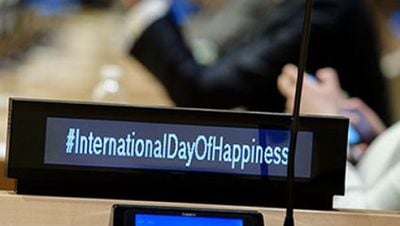Since 2013 the United Nations has celebrated the International Day of Happiness on March 20 as a way recognize the importance of happiness to people’s lives.
Although few would disagree that “happiness” is a basic aspiration of humankind, until recently there was considerably less agreement around what the term means; why it is important; and how it can be achieved. Fortunately, an explosion of work over the past decade is starting to settle many of these questions. For the very latest on all these points then look at the new World Happiness Report from the United Nations Sustainable Development Network that is released today.
As our understanding of the science of happiness grows a natural next question to ask is whether the State should – or indeed can – have a role in delivering happiness?
Does government have a role?
“We hold these truths to be self-evident, that all men are created equal, that they are endowed by their Creator with certain unalienable Rights, that among these are Life, Liberty and the pursuit of Happiness.” US Declaration of Independence, 1776.
When the US founding fathers signed the Declaration of Independence we cannot be sure what form of happiness they saw as an inalienable right, but it seems they understood that the actions of a government could either help or hinder a population’s subjective well-being.
An opinion I have often heard expressed around the world can be paraphrased as “the government has no business in telling citizens how to be happy”. This is in part a matter of political philosophy. But, if you accept that argument, you might also feel that the government has no business in telling citizens how to live any aspects of their lives. Perhaps they do not. But many governments do take an active role in seeking to influence other aspects of private life such as diet, exercise, responsible parenting and more.
The growing number of politicians working on happiness appear to be moving in a similar direction. For example, the UAE’s Minister for Happiness and Well-being, Ohood Al Roumi, explained she saw her role as facilitating the conditions in her country that would best allow people to pursue happiness if they chose to do so. The Bhutanese government, through their Gross National Happiness philosophy, follow a similar approach: their constitution pledging that the "State shall strive to promote those conditions that will enable the pursuit of Gross National Happiness."
Such facilitation might come in many forms. And it could involve aspects of life in which government already has an accepted role, but which also promote happiness: health care, employment, social protection and so on. But so long as citizens have a choice, and do not feel they are being manipulated or dictated to, it does not seem unreasonable to argue that government’s role in promoting subjective well-being is any less legitimate than its role in promoting human development for example.
But what can government do?
It is one thing to argue that government has a legitimate role in promoting happiness. It is another to argue that government can succeed in promoting it. But a growing body of work is showing in both theory – and practice – how policy makers can improve people’s happiness.
Two reports from the Global Council for Happiness and Well-being, the second of which was published in February this year, investigate practical policy suggestions across a range of areas. The work has implications for policy in many areas important to human development.
Consider what a greater focus on happiness might mean for health and education. The authors argue that viewing health policy through a happiness lens would lead the health system to give a greater priority to mental health: which, in every society, has an enormous impact on the burden of disease and generates untold misery. The chapter also argues that improvements to end-of-life care, with more emphasis on palliative care and pain relief, would be important for people’s happiness. And – this is a particularly interesting result of a happiness approach – benefits such as these should be valued according to how they help both those who are dying and their loved ones.
Another chapter looks at education and the experience – in several countries – of schools that teach Positive Education, the goal of which is to produce both well-being and the traditional outcomes of schooling. Results so far indicate that the such programs improve student exam results and their fitness for life, through things like increased emotional resilience.
But perhaps even more interesting is some of the thinking around how a pursuit of happiness might lead – inexorably – to more profound changes in the organisation of government itself.
A well-being approach would “fundamentally change the ways in which policies are evaluated”. At the moment governments often assess competing policies according to their costs and benefits in dollars, which is often leads to an undervaluation of hard to quantify social policies. But using happiness as a focus, policy makers can compare the impacts of gains health, income, and education according to how they benefit well-being.
Using happiness as an overarching policy objective would also help cross-government cooperation. The report argues for instance that with “overall happiness as the goal, distinctions between sectors of government (health, housing, education, and so on) become fairly arbitrary, and cross-sector prioritization is important for making the best use of resources.”
Moreover, using arguments similar to those that led to the Human Development Index, a focus on average life satisfaction would provide a simple summary measure of the quality of life, broader than GDP and simpler than a dashboard of social indicators. Paying attention to a happiness measure – and the factors that affect it – would take public debate far beyond GDP. And that could be a real asset to decision-making. After all, as Aristotle, understood some 2400 years ago, happiness, not money, is the ultimate goal of life.
The HDialogue blog is a platform for debate and discussion. Posts reflect the views of respective authors in their individual capacities and not the views of UNDP/HDRO.
HDRO encourages reflections on the HDialogue contributions. The office posts comments that supports a constructive dialogue on policy options for advancing human development and are formulated respectful of other, potentially differing views. The office reserves the right to contain contributions that appear divisive.


